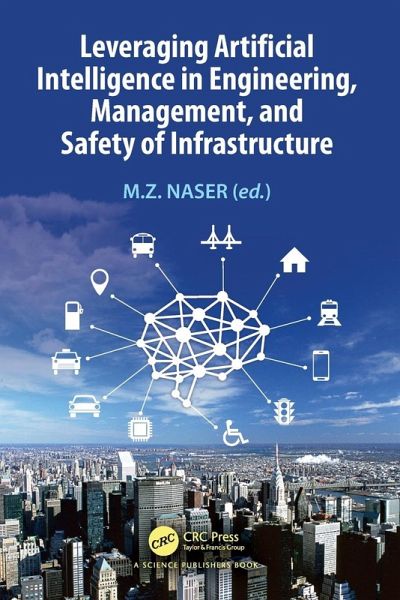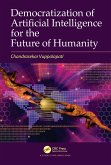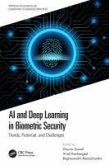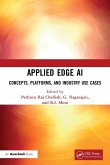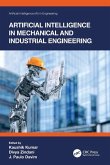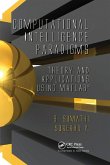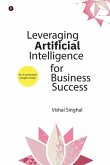Leveraging Artificial Intelligence in Engineering, Management, and Safety of Infrastructure
Herausgeber: Naser, M Z
Leveraging Artificial Intelligence in Engineering, Management, and Safety of Infrastructure
Herausgeber: Naser, M Z
- Broschiertes Buch
- Merkliste
- Auf die Merkliste
- Bewerten Bewerten
- Teilen
- Produkt teilen
- Produkterinnerung
- Produkterinnerung
This unique book showcases the applications of various sub-fields of artificial intelligence (AI) in engineering, management and safety aspects of infrastructure.
Andere Kunden interessierten sich auch für
![Democratization of Artificial Intelligence for the Future of Humanity Democratization of Artificial Intelligence for the Future of Humanity]() Chandrasekar VuppalapatiDemocratization of Artificial Intelligence for the Future of Humanity111,99 €
Chandrasekar VuppalapatiDemocratization of Artificial Intelligence for the Future of Humanity111,99 €![AI and Deep Learning in Biometric Security AI and Deep Learning in Biometric Security]() AI and Deep Learning in Biometric Security81,99 €
AI and Deep Learning in Biometric Security81,99 €![Applied Edge AI Applied Edge AI]() Applied Edge AI68,99 €
Applied Edge AI68,99 €![Artificial Intelligence in Mechanical and Industrial Engineering Artificial Intelligence in Mechanical and Industrial Engineering]() Artificial Intelligence in Mechanical and Industrial Engineering72,99 €
Artificial Intelligence in Mechanical and Industrial Engineering72,99 €![Swarm Intelligence Swarm Intelligence]() Swarm Intelligence95,99 €
Swarm Intelligence95,99 €![Computational Intelligence Paradigms Computational Intelligence Paradigms]() S. SumathiComputational Intelligence Paradigms92,99 €
S. SumathiComputational Intelligence Paradigms92,99 €![Leveraging Artificial Intelligence for Business Success Leveraging Artificial Intelligence for Business Success]() Vishal SinghalLeveraging Artificial Intelligence for Business Success15,99 €
Vishal SinghalLeveraging Artificial Intelligence for Business Success15,99 €-
-
-
This unique book showcases the applications of various sub-fields of artificial intelligence (AI) in engineering, management and safety aspects of infrastructure.
Hinweis: Dieser Artikel kann nur an eine deutsche Lieferadresse ausgeliefert werden.
Hinweis: Dieser Artikel kann nur an eine deutsche Lieferadresse ausgeliefert werden.
Produktdetails
- Produktdetails
- Verlag: CRC Press
- Seitenzahl: 446
- Erscheinungstermin: 4. Oktober 2024
- Englisch
- Abmessung: 234mm x 156mm x 24mm
- Gewicht: 640g
- ISBN-13: 9781032305752
- ISBN-10: 1032305754
- Artikelnr.: 71557497
- Herstellerkennzeichnung
- Libri GmbH
- Europaallee 1
- 36244 Bad Hersfeld
- gpsr@libri.de
- Verlag: CRC Press
- Seitenzahl: 446
- Erscheinungstermin: 4. Oktober 2024
- Englisch
- Abmessung: 234mm x 156mm x 24mm
- Gewicht: 640g
- ISBN-13: 9781032305752
- ISBN-10: 1032305754
- Artikelnr.: 71557497
- Herstellerkennzeichnung
- Libri GmbH
- Europaallee 1
- 36244 Bad Hersfeld
- gpsr@libri.de
M.Z. Naser is a tenure-track faculty member at the School of Civil and Environmental Engineering & Earth Sciences, a member of the AI Research Institute for Science and Engineering (AIRISE) at Clemson University, USA. Dr. Naser has co-authored over 100 publications and has 10 years of experience in structural engineering and AI. His research interest spans causal & explainable AI methodologies to discover new knowledge hidden within the domains of structural & fire engineering and materials science to realize functional, sustainable, and resilient infrastructure. He is a registered professional engineer and a member of various international editorial boards and building committees.
1. Convolutional Neural Networks and Applications on Civil Infrastructure
2. Identifying Non-linearity in Construction Workers' Personality: Safety
Behaviour Predictive Relationship Using Neural Network and Linear
Regression Modelling 3. Machine Learning Framework for Predicting Failure
Mode and Flexural Capacity of FRP-Reinforced Beams 4. A Novel Formulation
for Estimating Compressive Strength of High Performance Concrete Using Gene
Expression Programming 5. Implementation of Data-Driven Approaches for
Condition Assessment of Structures and Analyzing Complex Data 6. Automatic
Detection of Surface Thermal Cracks in Structural Concrete with Numerical
Correlation Analysis 7. State-of-the-Art Research in the Area of Artificial
Intelligence with Specific Consideration to Civil Infrastructure,
Construction Engineering and Management, and Safety 8. Artificial
Intelligence in Concrete Materials: A Scientometric View 9. Active Learning
Kriging-Based Reliability for Assessing the Safety of Structures: Theory
and Application 10. A Bayesian Estimation Technique for Multilevel Damage
Classification in DBHM 11. Machine learning and IoT Data for Concrete
Performance Testing and Analysis 12. Knowledge-enhanced Deep Learning for
Efficient Response Estimation of Nonlinear Structures 13. Damage Detection
in Reinforced Concrete Girders by Finite Element and Artificial
Intelligence Synergy 14. Deep Learning in Transportation Cyber-Physical
Systems 15. Artificial Intelligence in the Construction Industry: Theory
and Emerging Applications for the Future of Work 16. The Use of Machine
Learning in Heat Transfer Analysis for Structural Fire Engineering
Applications 17. Using Artificial Intelligence to Derive Temperature
Dependent Mechanical Properties of Ultra-High Performance Concrete 18.
Smart Tunnel Fire Safety Management by Sensor Network and Artificial
Intelligence
2. Identifying Non-linearity in Construction Workers' Personality: Safety
Behaviour Predictive Relationship Using Neural Network and Linear
Regression Modelling 3. Machine Learning Framework for Predicting Failure
Mode and Flexural Capacity of FRP-Reinforced Beams 4. A Novel Formulation
for Estimating Compressive Strength of High Performance Concrete Using Gene
Expression Programming 5. Implementation of Data-Driven Approaches for
Condition Assessment of Structures and Analyzing Complex Data 6. Automatic
Detection of Surface Thermal Cracks in Structural Concrete with Numerical
Correlation Analysis 7. State-of-the-Art Research in the Area of Artificial
Intelligence with Specific Consideration to Civil Infrastructure,
Construction Engineering and Management, and Safety 8. Artificial
Intelligence in Concrete Materials: A Scientometric View 9. Active Learning
Kriging-Based Reliability for Assessing the Safety of Structures: Theory
and Application 10. A Bayesian Estimation Technique for Multilevel Damage
Classification in DBHM 11. Machine learning and IoT Data for Concrete
Performance Testing and Analysis 12. Knowledge-enhanced Deep Learning for
Efficient Response Estimation of Nonlinear Structures 13. Damage Detection
in Reinforced Concrete Girders by Finite Element and Artificial
Intelligence Synergy 14. Deep Learning in Transportation Cyber-Physical
Systems 15. Artificial Intelligence in the Construction Industry: Theory
and Emerging Applications for the Future of Work 16. The Use of Machine
Learning in Heat Transfer Analysis for Structural Fire Engineering
Applications 17. Using Artificial Intelligence to Derive Temperature
Dependent Mechanical Properties of Ultra-High Performance Concrete 18.
Smart Tunnel Fire Safety Management by Sensor Network and Artificial
Intelligence
1. Convolutional Neural Networks and Applications on Civil Infrastructure
2. Identifying Non-linearity in Construction Workers' Personality: Safety
Behaviour Predictive Relationship Using Neural Network and Linear
Regression Modelling 3. Machine Learning Framework for Predicting Failure
Mode and Flexural Capacity of FRP-Reinforced Beams 4. A Novel Formulation
for Estimating Compressive Strength of High Performance Concrete Using Gene
Expression Programming 5. Implementation of Data-Driven Approaches for
Condition Assessment of Structures and Analyzing Complex Data 6. Automatic
Detection of Surface Thermal Cracks in Structural Concrete with Numerical
Correlation Analysis 7. State-of-the-Art Research in the Area of Artificial
Intelligence with Specific Consideration to Civil Infrastructure,
Construction Engineering and Management, and Safety 8. Artificial
Intelligence in Concrete Materials: A Scientometric View 9. Active Learning
Kriging-Based Reliability for Assessing the Safety of Structures: Theory
and Application 10. A Bayesian Estimation Technique for Multilevel Damage
Classification in DBHM 11. Machine learning and IoT Data for Concrete
Performance Testing and Analysis 12. Knowledge-enhanced Deep Learning for
Efficient Response Estimation of Nonlinear Structures 13. Damage Detection
in Reinforced Concrete Girders by Finite Element and Artificial
Intelligence Synergy 14. Deep Learning in Transportation Cyber-Physical
Systems 15. Artificial Intelligence in the Construction Industry: Theory
and Emerging Applications for the Future of Work 16. The Use of Machine
Learning in Heat Transfer Analysis for Structural Fire Engineering
Applications 17. Using Artificial Intelligence to Derive Temperature
Dependent Mechanical Properties of Ultra-High Performance Concrete 18.
Smart Tunnel Fire Safety Management by Sensor Network and Artificial
Intelligence
2. Identifying Non-linearity in Construction Workers' Personality: Safety
Behaviour Predictive Relationship Using Neural Network and Linear
Regression Modelling 3. Machine Learning Framework for Predicting Failure
Mode and Flexural Capacity of FRP-Reinforced Beams 4. A Novel Formulation
for Estimating Compressive Strength of High Performance Concrete Using Gene
Expression Programming 5. Implementation of Data-Driven Approaches for
Condition Assessment of Structures and Analyzing Complex Data 6. Automatic
Detection of Surface Thermal Cracks in Structural Concrete with Numerical
Correlation Analysis 7. State-of-the-Art Research in the Area of Artificial
Intelligence with Specific Consideration to Civil Infrastructure,
Construction Engineering and Management, and Safety 8. Artificial
Intelligence in Concrete Materials: A Scientometric View 9. Active Learning
Kriging-Based Reliability for Assessing the Safety of Structures: Theory
and Application 10. A Bayesian Estimation Technique for Multilevel Damage
Classification in DBHM 11. Machine learning and IoT Data for Concrete
Performance Testing and Analysis 12. Knowledge-enhanced Deep Learning for
Efficient Response Estimation of Nonlinear Structures 13. Damage Detection
in Reinforced Concrete Girders by Finite Element and Artificial
Intelligence Synergy 14. Deep Learning in Transportation Cyber-Physical
Systems 15. Artificial Intelligence in the Construction Industry: Theory
and Emerging Applications for the Future of Work 16. The Use of Machine
Learning in Heat Transfer Analysis for Structural Fire Engineering
Applications 17. Using Artificial Intelligence to Derive Temperature
Dependent Mechanical Properties of Ultra-High Performance Concrete 18.
Smart Tunnel Fire Safety Management by Sensor Network and Artificial
Intelligence

